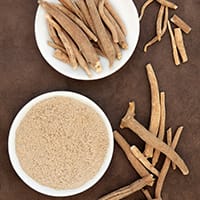
We all know that sleep is extremely important to normal function. Without it our body doesn’t get to regenerate and repair, stress gets more stressful and life generally gets harder. With our 24/7 lifestyle, it’s perhaps not surprising that sleep disturbances are amongst the most frequently treated conditions in natural health practice. Herbs can be especially useful when it comes to combating sleep disturbances.
Whilst there are many different types of sleep deprivation and insomnia, generally they can be divided into two patterns; difficulty getting to sleep, and difficulty staying asleep. Remedies for no two patients are the same. The causes of sleep disturbances vary from person to person, and these are amongst the underlying factors your herbalist needs to assess when mixing up the most appropriate remedy. However, you may find it helpful to take the following measures to help you wind down:
Add herbs to your bath
- Using herbs in your bath. Lavender is traditional for promoting a deep and healthful sleep, but you can also use oats or chamomile. To avoid mess, try putting the herbs into a muslin bag.
- Making a sleep-inducing herbal tea. A traditional combination for sleep is valerian, hops and passionflower. If you’re inclined to need to visit the toilet in the night, you may prefer to use capsules or tablets, which are available from health food stores.

Herbal remedies
- A favourite herbal remedy for those who can’t stay asleep is the Ayurvedic herb, Ashwagandha, which is so gentle and safe that it’s often given to children in India. Rather than knocking you out immediately, the effects come on slowly and reach their peak in the small hours when you really need to stay asleep. Try three capsules of Ashwagandha before retiring. This dose can be adjusted up or down according to the results.

Exercise and lavender
- Back up your sleep-inducing efforts by getting some daytime exercise in the fresh air. Wear breathable nightwear and have a comfortable mattress and pillows. Hang heavy curtains to block out the light. Establish winding down rituals at night, such as no computers, or stimulating TV programmes after 8pm. Ban TVs, mobile and cordless phones from the bedroom to reduce ‘electronic smog’. Don’t eat within 3 hours of going to bed, or conversely, if you wake up because you are hungry, have 2 oatcakes as pre-bed snack. And back to the herbs, sprinkle a little lavender on your pillow!

CNM’s Herbal Medicine Diploma Course is taught in London, Manchester, and Dublin. Based on naturopathic, holistic principles, the Course incorporates Western herbs and the energetic approach of Ayurvedic and Chinese Medicine. Herbal students at CNM are also given a good understanding of additional natural diagnostic and therapeutic tools, so that they are equipped to offer their clients lifestyle and nutritional advice. Combined with a healthy lifestyle and optimal nutrition, herbal medicine can form part of a winning formula for a lifetime of health and vitality.
By Herbalist and Iridologist Peter Jackson Main, Course Leader in Herbal Medicine at CNM.


